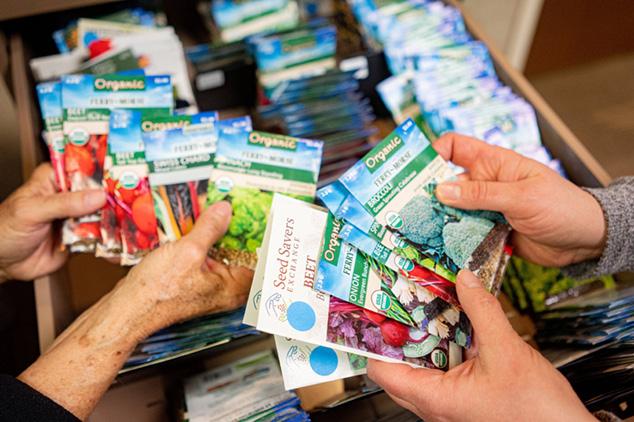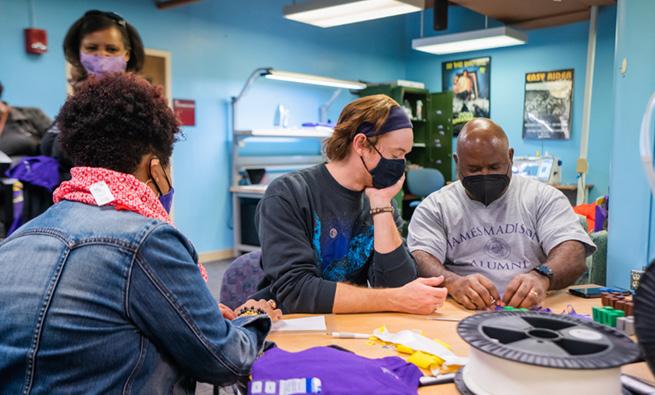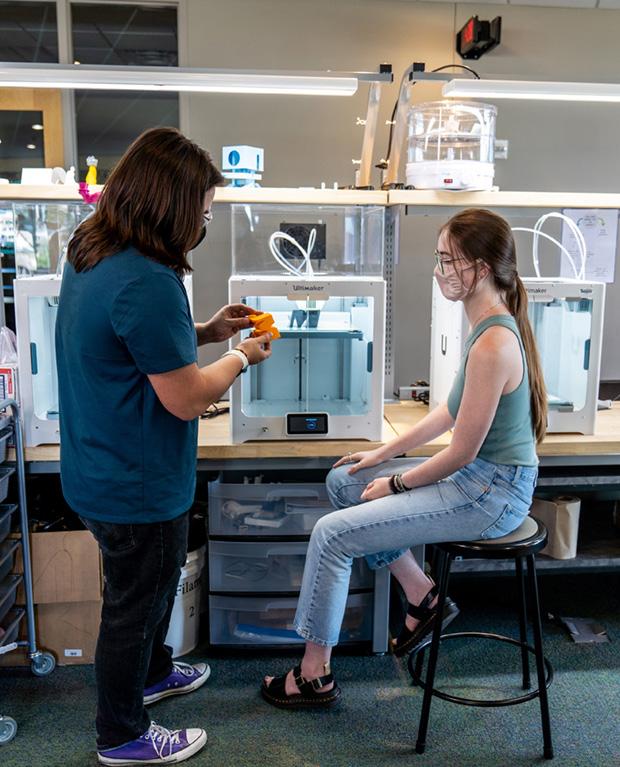
4 minute read
Community seed library sows hope in uncertain times (page
“Gardening is a privilege that requires time, money, and space. My hope is that the Community Seed Library will lower some of these barriers not only by providing seeds and supplies, but by building community around shared knowledge.” ~ Sarah Pritchard, organizer
COMMUNITY SEED LIBRARY sows hope in uncertain times
There is something inherently comforting in preparing a garden bed. Who can resist tilling the soil, tugging at the weeds, and eventually plucking that ripe tomato, still warm from the sun? In late February of 2020, thanks to an internal grant made possible by the generosity of Libraries donors, the Community Seed Library opened in the lobby of Carrier Library. At a well-attended launch event, students, faculty, and community members lined up to dream—perusing the seeds and collecting what they needed for their own gardens. Planting could begin, they imagined, soon.
Just a few weeks later, with the world in lockdown due to COVID-19, comfort was in short supply. But Seed Library founders Sarah Pritchard and Liz Chenevey had an idea. With all those seeds tucked away in Carrier Library, why not start a no-contact, multilingual ordering and off-site pick-up service, so that community members could still plant their gardens? With a bit of careful planning, and a mention in the local newspaper, Sarah and Liz distributed thousands of seeds to hundreds of would-be gardeners—including neighborhood children stuck at home—starting in April 2020.
Like traditional libraries, seed libraries thrive on sharing. Start-up expenses for JMU Libraries’ Community Seed Library were covered through gifts—gifts of money and gifts of seeds. And while the “return” of seeds is welcome, should a gardener feel inspired to save them after harvest, it is not required. Now in its second year of operation, the seed library is available for everyone to use and is open in the lobby of Carrier Library during normal library hours. Operations have expanded to a sister seed library in Massanutten Regional Library in downtown Harrisonburg. L

~ LIZ CHENEVEY, organizer
Libraries makerspaces GET CREATIVE!
Makerspaces cultivate curiosity, creativity, and exploration in as many ways as possible.
The Makery locations in JMU Libraries provide access to high-end equipment like 3D printers, vinyl and laser cutters, cameras, audio recording devices, mixand-match electronics components, and sewing machines. Through classes and events, The Makery empowers anyone to discover themselves as a maker. Users create everything from beautiful 3D models,


electronic games, tools, and artwork, to audio recordings of original melodies.
When the pandemic hit and our spaces temporarily closed, staff from The Makery tapped into their own creativity to support the JMU community. Distributing equipment to faculty who needed to deliver online courses became top priority. Working together with staff across the Libraries, they made as much equipment as possible available for long-term checkout. The Makery’s workshops also went online, adding workshops in mixed-media painting as a contributor to student mental health, alongside offerings in podcasting and 3D modeling and printing. As restrictions eased, staff collaborated with students and faculty to reopen our spaces and offer hands-on experiences in printmaking, electronics, 3D scanning, and textiles once again. L
HIGHLIGHTS
from Special Collections

Special Collections Collections is JMU Libraries’ repository for rare, irreplaceable, unique, or otherwise valuable materials, including many that document the history of the Shenandoah Valley and JMU or support the teaching and research priorities of our faculty. Our librarians and archivists preserve rare books, manuscripts, and objects for future generations, describe them so that they can be found, and engage with scholars and students interested in using them. JMU students and valley scholars typically love visiting Special Collections in person to get up-close and personal with the collections’ fragile, rare, and beautiful materials or books that must be handled to be understood. In a year when visiting the reading room was not safe, Special Collections piloted the use of video to provide access. Staff filmed artists’ books, special fore-edge paintings Custom housing created by the Special Collections preservation officer (in which a hidden image can only be exposed by for a collection of photographs and historical objects in JMU Libraries fanning the pages of a volume), and highlights Special Collections. Courtesy of JMU Libraries Special Collections.from our moveable and pop-up book collection, as well as other more unusual items like toys and games. These videos offered a glimpse into the vast and varied treasures of JMU Libraries Special Collections. This year, we also continued to acquire materials that support the JMU curriculum and our values, especially the Libraries’ ongoing work to collect materials reflecting a variety of lived experiences. Thanks to the Frances Jobson Francis Special Collections fund, we were able to acquire several new artists’ books and significant works in African American children’s literature and Black poetry. Among these titles are We real cool by Gwendolyn Brooks, Ego-tripping: and other poems for young people by Nikki Giovanni, and there we wept: poems by bell hooks, and Between ourselves by Audre Lorde. Special Collections also acquired several early Third World Press publications and other important signed works by editor, poet, and activist Haki Madhubuti, in support of summer Legacy Seminar programming organized by our collaborators at the Furious Flower Poetry Center. L



